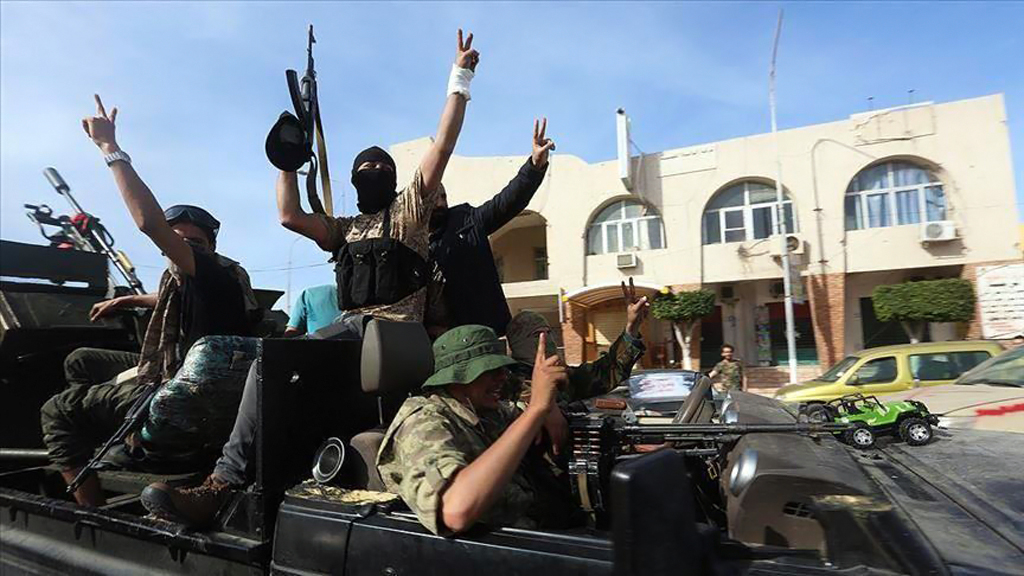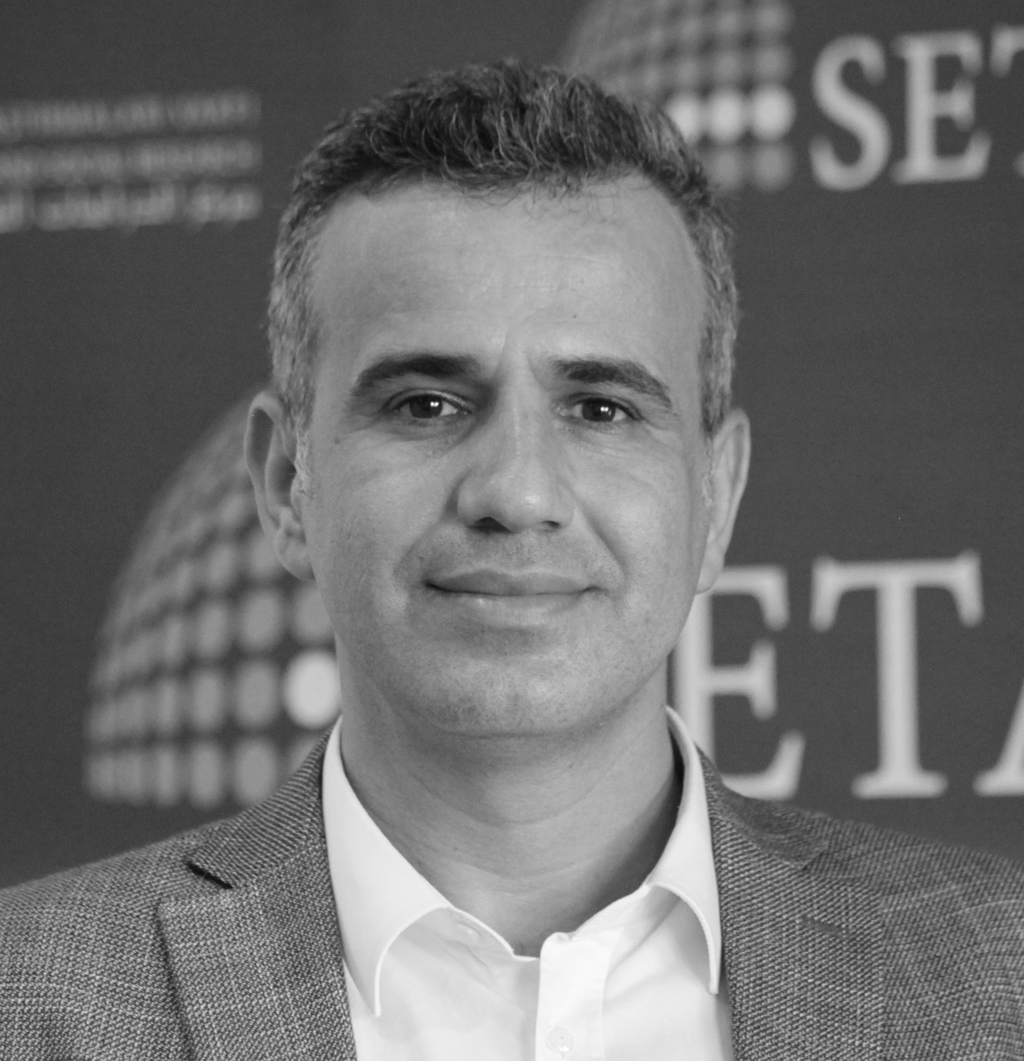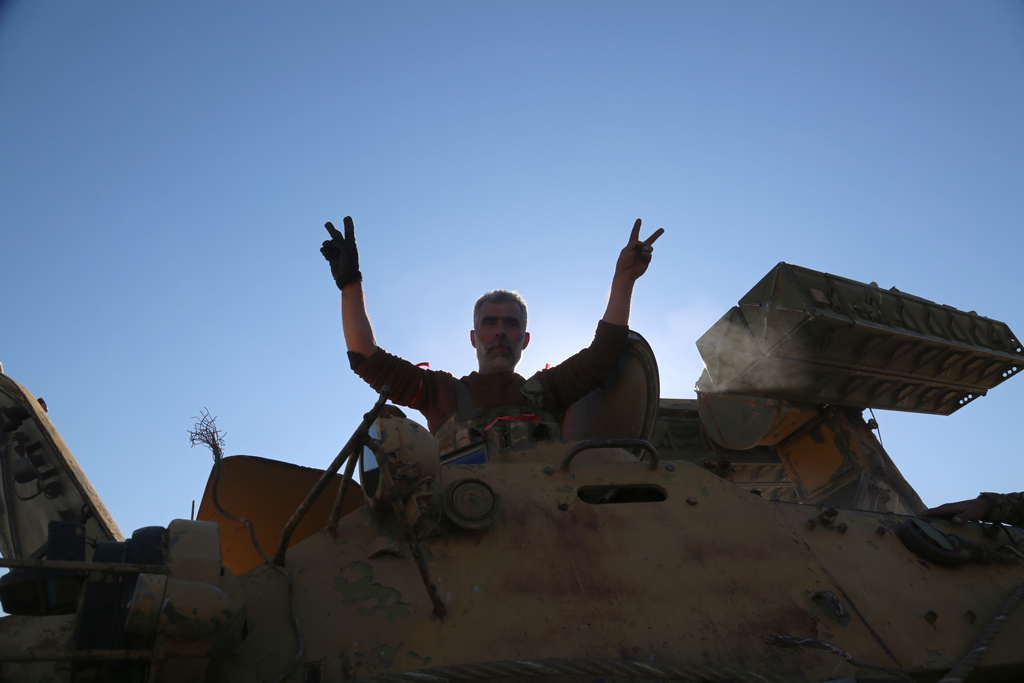
Decisive, dissuasive will win in Libya
Following back-to-back successes by Government of National Accord, all sides seem to reorder positions
Share
Following back-to-back successes of the Government of National Accord, Libya’s UN-recognized legitimate administration, all sides seem to have reordered their positions.
The safety of the capital Tripoli is no longer debated and the threats to the existence of GNA were eliminated.
Gaining these achievements largely thanks to the support from Turkey, the GNA is working toward new achievements while also preparing for the restructuring of the country with the same support.
The putschist Khalifa Haftar’s forces have switched to a defensive stance, and their main purpose has been shifted to maintaining the territory they hold.
On the other hand, the pro-Haftar forces have also changed their expectations from being on the winning side of the struggle to being on the not-completely-losing side, to minimize their losses.
To accomplish that, they have drastically increased their activities to stop the GNA’s military advances.
Previously having engaged to a minimum extent, the US is also starting to adopt a more active attitude on the GNA’s side.
New breaking points of the crisis: Sirte and Jufra
The crisis in Libya is already at a turning point.
Symbolized specifically with Sirte and Jufra in regards to the reshaping positions of the sides involved, this turning point is significant enough to affect the course and perhaps even the fate of the crisis in Libya.
Likewise, the GNA having control over Sirte will be an important step in advancing towards Benghazi and Tobruk in eastern Libya and also securing the strategic petroleum production areas in the south, called “the petroleum crescent.”
In other words, Sirte is a threshold in the process of eliminating Haftar’s forces and establishing the GNA’s authority nationwide.
A similar argument on the military aspect can be made for Jufra Airbase.
Therefore, it is paramount to secure the airbase, which is inseparable from Sirte for its strategic importance in the short term, for the GNA to realize its mid- and long-term goals.
Haftar, starting to lose ground, is also aware of the strategic importance of Sirte and Jufra and so he may choose to make a stand for as long as he can in order not to retreat from these two areas.
The real problem here is how long he can hold out.
The last six months have clearly shown that the Haftar militia cannot withstand the GNA, which has the backing of Turkey and is superior in the field.
Therefore under normal circumstances, it is expected that the Haftar militia will not put up much of a fight against the GNA’s advance.
At this point, rather than the militia and the military capacity Haftar has, the attitudes and positions of his backers come into play.
Yet, Haftar who has no legitimacy and keeps losing military credibility, still has a certain amount of support.
This support is not for Haftar personally, but for the mindset he represents and for the goals desired by his supporters.
In other words, the support which used to be willingly given is now given reluctantly to remain within the Libyan equation as a result of developments in the field.
Declared and undeclared red lines
The status quo and territorial control that emerged in light of the recent developments are not final, but temporary.
However, the course of the developments is related to the implicitly and explicitly declared red lines and how these red lines would be crossed.
For the GNA and the most important player Turkey backing them, these red lines are clear enough to include Sirte and Jufra while not remaining confined to them: they also involve driving the putschist militia groups and mercenaries from the areas they control and establishing political and economic stability by establishing governmental authority across Libya.
Diplomatic and political negotiations are always a part of the process of realizing this goal, while also not refraining from using military methods when needed.
Following his failures in the field, Haftar is no longer able to individually declare a red line.
Instead, the aforementioned red lines are being drawn by his supporters, directly or indirectly.
Russia, for example, while claiming not to have any official military presence in Libya, in addition to the engagement made through the Wagner Group, it also recently transferred military aircraft to Haftar’s forces to keep the GNA from securing Sirte and Jufra.
Seeing as it would not be able to reap the benefits of their investments in Haftar, France took action to save at least some of it and while calling for a cease-fire, they also tried to block Turkey’s support for the GNA by making accusations and attempting to isolate Turkey.
This attitude by France is without a doubt also influenced by the erosion of their influence not only in Libya but also in the Eastern Mediterranean power struggle.
The UAE and Saudi Arabia are trying to remain inconspicuous, and rather minimize their losses in Libya through Egypt and the Arab League while trying to remain part of the equation.
At this point, it could be said that Egypt, also influenced by their economic and political dependence on the UAE and Saudi Arabia, has shown a rather direct attitude against the recent developments.
Mobilizing on June 6 when the GNA launched its Operation Paths to Victory to capture Sirte and Jufra following the securing of all of western Libya, the al-Sisi administration met Haftar and Aguila Saleh, calling for a cease-fire and offering to initiate the political process.
This “Cairo Declaration” was supported by all the Haftar supporters mentioned above.
As the GNA declared that there will not be a cease-fire before Sirte and Jufra are liberated and operations in these areas continued, al-Sisi made another move on June 20 declaring Sirte and Jufra to be Egypt’s “red line,” signaling that they could commence military intervention against Libya if ownership of these regions were to change.
Test of decisiveness and dissuasiveness
Currently, the main goal of Haftar and his supporters is to stop the military advance made by GNA and to convert the process from military to political while they hold Sirte and Jufra.
If they achieve this goal, Haftar will be able to consolidate his military power with the support he receives and his supporters will continue to play the influential role they set for themselves in solving the Libyan crisis.
In this context, it could be said that plans to have power over all of Libya were postponed.
On the contrary, a result quite opposite of this could emerge.
In other words, the GNA’s control over Sirte and Jufra would hasten the process of Haftar losing military power in the field, and in the region politically.
The players backing him would also lose their grip in the process of solving the Libyan crisis, and their chances of being isolated would increase.
The attempts by the Haftar supporters to establish red lines directly or indirectly through Sirte and Jufra are aimed at preventing this risk.
On the other hand, the present situation is not sustainable or acceptable for either the GNA or Turkey.
Because the present situation carries the risk of making it impossible for these players to realize their Libyan strategies.
Thus, Haftar’s forces retaining these two cities is a matter of serious pressure, by allowing Haftar and his supporters to always effectively involve themselves in the political process.
Therefore, while Haftar and his supporters try to maintain the current situation, the GNA and Turkey attempt to carry on with the momentum gained in the field.
Here, besides other variables, the decisiveness of the sides in regards to red lines they have drawn and how dissuasive they can be against the opposing side.
In this context, the GNA has impeccably stressed their decisiveness by continuing operational preparations within Operation Paths to Victory and declaring all of Libya their red line, while Turkey has done the same by way of high-level political discourse, high-level visits to Tripoli and military exercises carried out in the East Mediterranean and on the coast of Libya.
Considered through the perspective of Haftar and his supporters, the decisiveness and dissuasiveness of Egypt and Russia can be more effective in the present situation, compared to the other supporters.
However, in the case of Egypt, who signaled potential military intervention against Libya, it is quite handicapped in supporting their discourse due to its economic and political problems in addition to a level of military readiness, security issues in the Sinai Peninsula and problems it is having with Ethiopia due to the Renaissance Dam.
Thus, whether the cost of a potential Egyptian intervention is worth it to al-Sisi administration is arguable.
In the case of Russia, it is clear that the Vladimir Putin administration has obtained important gains with little cost in Libya, and instead of losing them, they would like to preserve and if possible increase these gains.
However, the clear increase of Russian influence on the Libyan crisis is undesirable for not only the GNA and Turkey but also for the US and many European countries.
Therefore, while remaining cautious, the US has started to involve in higher engagements in the Libyan crisis which they used to engage only at a low level, and the Russian influence in Libya is increasingly more stressed especially in American security bureaucracy and in NATO.
That being said, it is not expected for the US to enact a clear and extensive policy for Libya in the short term, neither individually nor through NATO.
Therefore, the US can limit Russian influence by clearly expressing support for the GNA and Turkey, rather than playing a decisive role in the developments in the field.
In the case of France, it could be said that France has lost its initiative in the Libyan crisis and cannot easily win it back.
Suggestions for solving the crisis, the diplomacy led with Libya’s neighbors and statements made to limit Turkey’s influence by French President Emmanuel Macron has not been reciprocated by international public opinion and in the field.
From a military perspective, attempts by the French navy to harass Turkish ships have also failed.
Decisions made within the Arab League led by Egypt, the UAE and Saudi Arabia along with the appeals, have had a limited effect on the developments in the field, just like appeals made by the European Union.
While the point that has been arrived at in the Libyan crisis constitutes a test of decisiveness and dissuasiveness for the sides involved, it should be noted that the issue is only a turning point within the process.
Based on how the process will evolve at this turning point, it is inevitable for the power distribution in the region to be reshaped.
That being said, it is possible that elongating the current situation would have positive consequences for Haftar and his supporters, and negative ones for the GNA and Turkey.
As time passes, Russia’s increased involvement in Libya or a military adventure by Egypt would change the course of the crisis and make it more complicated.
Therefore it becomes more and more important for the GNA to secure Sirte and Jufra through careful planning backed by Turkey and all the while considering the risks.
At this point, the most important advantages of GNA and Turkey is their moral superiority, legitimacy along with their decisiveness and their increasing dissuasiveness in the process.
[AA, 6 July 2020]
Tags »
Related Articles








